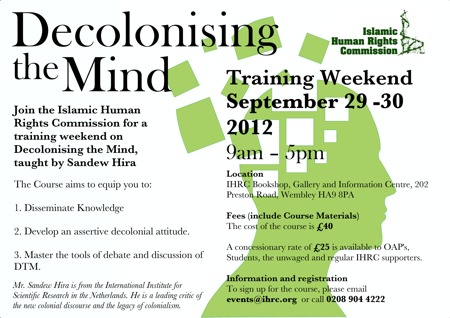Mr. Sandew Hira is from the International Institute for Scientific Research in the Netherlands. He is a leading critic of the new colonial discourse and the legacy of colonialism.
Background
The legacy of colonialism is an open wound in present-day western society that has different names: racism, islamophobia, white supremacy, extreme right etc.
Despite the gains won by decolonization in the sphere of politics, economics and international relations there is still one dimension of colonialism that has survived the process of decolonization in the fifties and sixties of the last century, that is the dimension of mental colonialism.
Mental colonialism created a narrative of race relations that still dominates the discourse in western media: the supposed superiority of western culture and the supposed inferiority of non-western cultures.
This narrative has changed in the course of four centuries of colonialism, but is its basic assumptions are widespread in the educational system and the discourse in the media. It is there in the mind of both the former colonizer and the colonized. Decolonizing the mind means changing the mindset of both groups.
Target of the course
The course Decolonizing the Mind has the following targets:
- Knowledge dissemination: To present new decolonized knowledge on colonialism and its legacy. The student gets an integrated view on five dimensions of colonialism: geographical, economic, political, social and mental. The student gets to know the dominant propositions by scholars from the current of scientific colonialism and their arguments. The critique of these propositions and arguments are presented from the point of view of DTM and an alternative framework is presented to understand the legacy of colonialism in present day society.
- Developing an assertive decolonial attitude. DTM is not only a matter of consuming new knowledge. It is an attitude that is firmly grounded in the belief that the dominant authority of knowledge (science, government, education, and media) and its policy implications can and should be challenged with sound counterpropositions and arguments. The course aims to build such an attitude.
- Mastering the tools of debate and discussion for DTM. Knowledge and attitude might not be enough to decolonize the mind. The main instruments of DTM are discussions and debates. The course trains student in discussion and debate both in term of content as well as form, presentation and attitude. DTM is a struggle. Training in discussion and debate is training in the art of intellectual struggle.
The Course aims to equip you to:
-
Disseminate Knowledge
-
Develop an assertive decolonial attitude.
-
Master the tools of debate and discussion of DTM.
Date
29 and 30 September 2012
Location
IHRC office, 202 Preston Road, Wembley HA9 8PA
Fees (include Course Materials)
The cost of the course is £40. Buy your ticket by calling us on 020 8904 4222
(A concessionary rate is available to OAP’s, Students, the unwaged and regular IHRC supporters)
Information and registration
To sign up for the course, please email events@ihrc.org, call 0208 904 4222.
Decolonizing the Mind – Course Programme
Saturday September 29th
|
08.30-09.00 |
Registration |
|
09.00-09.30 |
Personal introduction: who is who in the course (name, activities) Topics and line of the course |
|
09.30-10.15 |
Lecture: Short history of colonialism and the legacy in the multicultural society
|
|
10.15-10.30 |
Discussion |
|
10.30-11.15 |
Lecture: Mental colonialism and knowledge production
|
|
11.15-11.30 |
Discussion |
|
11.30-12.15 |
|
|
12.15-12.30 |
Discussion |
|
12.30-13.30 |
Lunch |
|
13.30-13.45 |
Preparation for debate (in the afternoon session): training for discussion and debate. Selection of topics, proposition, discussion and debating groups |
|
13.45-14.30 |
Discussion |
|
14.30-15.15 |
|
|
15.15-15.45 |
Tea break |
|
15.45-16.30 |
Session 3: training for media discussion: print, radio, television |
|
16.30-17.00 |
Evaluation and conclusion |
Sunday September 30th
|
08.30-09.00 |
Registration |
|
09.00-09.45 |
Lessons from the struggle of Afro Americans in the USA
|
|
09.45-10.00 |
Discussion |
|
10.00-10.45 |
Lecture: The development of multicultural societies in Europe
|
|
10.45-11.00 |
Discussion |
|
11.00-11.45 |
Lecture: Globalization, the rise of the rest and the fall of the west
|
|
11.45-12.00 |
Discussion |
|
12.00-12.30 |
Preparation for discussion on program and organization: issues involved in developing a program for action and the problem of organization |
|
12.30-13.30 |
Lunch |
|
13.30-14.30 |
|
|
14.30-15.300 |
|
|
15.30-16.00 |
Tea break |
|
16.00-16.30 |
|
|
16.30-17.00 |
|







